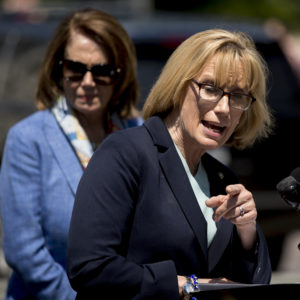In a recent interview, New Hampshire Democrat Sen. Maggie Hassan blamed the 2006 Republican-controlled DOJ for allowing Big Pharma companies to accelerate the opioid crisis.
“Career prosecutors had really done a ton of work reviewing tons of Purdue Pharma internal documents, and they had recommended really serious criminal charges against Purdue Pharma and their executives. At the eleventh hour, political appointees at the Department of Justice intervened and said you can only go after minor charges with these guys,” Hassan told New Hampshire Today with Jack Heath. “There is untold harm that might have been prevented here, and we might be in a very different place, and we need to know what happened.”
Well, we know what happened. And continued to happen during the following eight years of an Obama administration Justice Department as well.
Hassan also recently penned an op-ed calling for tighter drug price controls, accusing Big Pharma of profiteering off the lack of price transparency in the health care industry.
“For the past year, my colleagues and I on the Senate Finance Committee have worked together to draft bipartisan legislation that would lower the cost of prescription drugs for patients and taxpayers,” she wrote.” As we debated and compromised, one thing was clear to almost all of us: The lack of transparency in our healthcare system is a massive boon to the pharmaceutical industry.”
Ironically, as a report from Forbes shows, at least six senators on the Senate Finance Committee — Democrats and Republicans alike — take more than $100,000 from Big Pharma. The committee passed the Prescription Drug Pricing Reduction Act (PDPRA) in July, which would cap drug prices for seniors on Medicare, but has stalled in the Senate.
In fact, many of the members of Congress targeting pharmaceutical companies today have been more than happy to take their campaign donations in the past, including Sen. Hassan.
Big Pharma is the biggest lobbying industry in Washington, D.C., and since 2006, Big Pharma PACs have spent more than $880 million on lobbying at the state and federal levels, according to a Center for Public Integrity (CPI) report.
In 2006, Big Pharma gave twice as much to Republicans than Democrats, but as of 2018, Big Pharma gives roughly equal amounts to both parties, including Hassan. In 2006, Big Pharma gave a combined total of $16.8 million to Congress, but in 2018 gave a combined total of $28.8 million, according to data from the Center for Responsive Politics.
“Like other industry associations, Big Pharma tends to heavily favor incumbents,” said Aaron Scherb, director of legislative affairs at Common Cause. “In 2006, Republicans fully controlled Congress, so that’s probably the biggest reason why [they gave more money to Republicans]. In 2018 as it became more obvious throughout the year that Democrats were likely to win back the House, I think they were probably leveraging their bets to contribute more to Democrats as well.”
According to a report from The Daily Beast, the House Democratic leadership are some of the biggest recipients of Big Pharma money. House Majority Leader Rep. Steny Hoyer (D-Md.) and Majority Whip Rep. James Clyburn (D-S.C.) have taken a combined total of more than $1 million from Big Pharma over the last 10 years, according to the report, while House Speaker Nancy Pelosi (D-Calif.) has received more than $2 million.
2020 Democratic candidate Sen. Kamala Harris (D-Calif.) also takes campaign donations from Big Pharma executives at companies like Endo Pharmaceuticals (which manufacturers opioids) and Pfizer, among others.
Hassan’s leadership PAC took almost $30,000 from a Big Pharma PAC during the 2018 election cycle, according to the Center for Responsive Politics, making Big Pharma one of her top five industry contributors for that election cycle.
Earlier this year, a former Food & Drug Administration (FDA) medical adviser told Yahoo Finance that Congress is “owned” by Big Pharma. One only has to peruse FEC filings and databases like the Center for Responsive Politics’ OpenSecrets to follow the money from Big Pharma PACs and lobbying groups into the pockets of elected representatives from both parties.
Scherb told InsideSources that Big Pharma tends to target members of the two tax-writing committees — Senate Finance and the House Ways and Means — because a “significant number of pharma issues are related to tax.”
“Those are often seen as ‘fundraising committees’ given the significant interests that they represent and have jurisdiction over,” he said.
From a financial perspective, lobbying in Congress makes a lot of sense for Big Pharma and other lucrative industries.
“There are a couple of academic studies from the past couple years that show that for every dollar spent on lobbying, business entities get a significant rate of returns, 1,000 up to 22,000 percent rate of return, so they see that their lobbying money is a good investment from a financial perspective,” Scherb said. “But for the every day American who is paying more and more for high prescription drug costs, it’s not at all a good investment. Congress will hopefully catch up at some point.”

